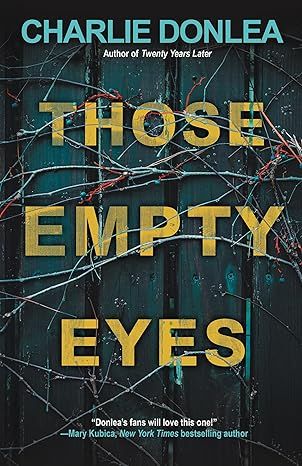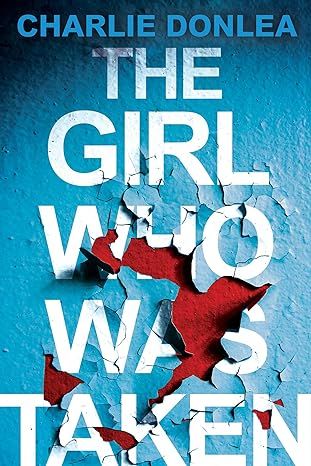Those Empty Eyes: A Chilling Novel of Suspense with a Shocking Twist
4.5
-
13,604 ratings
"Draws readers in from the first heart-stopping pages and doesn't let go until the end." – Mary Kubica, New York Times bestselling author of Local Woman Missing
The bestselling author of Twenty Years Later and master of modern suspense is back with a brilliantly twisting, skillfully plotted thriller perfect for fans of Jeneva Rose and Colleen Hoover’s Verity.
Alex Armstrong has changed everything about herself—her name, her appearance, her backstory. She’s no longer the terrified teenager a rapt audience saw on television, emerging in handcuffs from the quiet suburban home the night her family was massacred. That girl, Alexandra Quinlan, nicknamed Empty Eyes by the media, was accused of the killings, fought to clear her name, and later took the stand during her highly publicized defamation lawsuit that captured the attention of the nation.
It’s been ten years since, and Alex hasn’t stopped searching for answers about the night her family was killed, even as she continues to hide her real identity from true crime fanatics and grasping reporters still desperate to locate her. As a legal investigator, she works tirelessly to secure justice for others, too. People like Matthew Claymore, who’s under suspicion in the disappearance of his girlfriend, a student journalist named Laura McAllister.
Laura was about to break a major story about rape and cover-ups on her college campus. Alex believes Matthew is innocent, and unearths stunning revelations about the university’s faculty, fraternity members, and powerful parents willing to do anything to protect their children.
Most shocking of all—as Alex digs into Laura’s disappearance, she realizes there are unexpected connections to the murder of her own family. For as different as the crimes may seem, they each hinge on one sinister truth: no one is quite who they seem to be . . .
“Engrossing…not to be missed.” –Publishers Weekly STARRED REVIEW
Read more
Kindle
$0.00
Available instantly
Audiobook
$0.00
with membership trial
Hardcover
$14.99
Paperback
$10.77
Ships from
Amazon.com
Payment
Secure transaction
ISBN-10
1496744977
ISBN-13
978-1496744975
Print length
432 pages
Language
English
Publisher
Kensington
Publication date
April 22, 2024
Dimensions
5.5 x 0.98 x 8.25 inches
Item weight
13 ounces
Product details
ASIN :
B0B6DDGV89
File size :
1317 KB
Text-to-speech :
Enabled
Screen reader :
Supported
Enhanced typesetting :
Enabled
X-Ray :
Enabled
Word wise :
Enabled
Editorial reviews
"In this ambitious thriller from one of my favorites, Charlie Donlea weaves together seemingly separate mysteries in smart and completely unexpected ways, proving his finesse as a writer. Those Empty Eyes draws readers in from the first heart-stopping pages and doesn't let go until the end. Donlea's fans will love this one!" —Mary Kubica, New York Times bestselling author of Local Woman Missing
“The engrossing plot leads Alex to the university’s faculty and fraternities, to the über-rich and well connected, as well as links to her own family’s murder. This searing look at the legal system, entitlement, and exploitation is not to be missed.”—Publishers Weekly, STARRED REVIEW
Sample
PART I
The Final Witness
“If it bleeds, it leads.” —Garrett Lancaster
Fall 2013
CHAPTER 1
District Courthouse Thursday, September 26, 2013 3:05 p.m.
GARRETT LANCASTER WALKED TO THE COURTROOM PODIUM AS TELEVISION cameras recorded his every move and millions watched the live coverage. The defamation trial of Alexandra Quinlan versus the state of Virginia had captured the attention of the nation. Ever since the night the Quinlan family was slaughtered and the seventeen-year-old daughter was arrested for the murders, the country had been fascinated with Alexandra Quinlan. First, when she was accused of the crime and labeled a sadistic killer. And later, after she was exonerated when evidence surfaced that proved her innocence. And especially now, when Alexandra had turned around and sued the state of Virginia, claiming that the McIntosh Police Department and the Alleghany district attorney’s office had not only botched the investigation into her family’s murder, but ruined her life in the process.
Because of the media attention the Quinlan murders had received, Alexandra’s defamation case had been fast-tracked. Predicted to last two weeks, the trial was right on schedule. For the first few days—Monday through Thursday morning—the jurors had listened to testimony from a careful list of witnesses Garrett Lancaster had called in strategic order. Now, Garrett had Thursday afternoon and all of Friday to finish presenting his case. He planned to fill those hours with testimony from just two individuals, his final witnesses. If things went according to plan, the state’s defense attorneys would sit silently for the final two days of the prosecution’s case. They wouldn’t dare go after the testimony they heard today, and wouldn’t so much as think of cross-examining his witness tomorrow.
Garrett knew the untenable position he was about to put the state’s defense team in. He knew this because Garrett was usually the attorney doing the defending. It was only through a bizarre set of circumstances that he found himself in the unusual position of being the prosecuting attorney representing Alexandra Quinlan in her defamation suit against the state of Virginia. The managing partner at one of the biggest defense firms on the East Coast, Garrett was a defense attorney by trade, and therefore in the unique position of knowing his opponents inside and out.
Garrett had designed his strategy carefully. Despite the temptation to allow the jury to hear testimony from his two star witnesses earlier in the week, at the start of the trial when juries were easy to impress, he instead saved their testimony for now—Thursday afternoon and Friday morning. The plan was to wrap things up the following morning before lunch and then persuade the judge to adjourn for the weekend. Garrett wanted the testimonies from his final two witnesses—as well as their faces and tears and cracking voices—to be fresh on the jury members’ minds as they headed into the weekend. He wanted the testimony to linger for two long days before the jury reconvened Monday morning to listen to the attorneys for the state of Virginia mount their full, unfettered defense against Alexandra’s claims that the McIntosh Police Department was incompetent and that the Alleghany district attorney’s office was corrupt.
“Your honor,” Garret said after reaching the podium. Dressed smartly in a crisp navy suit and yellow tie, he carefully arranged his notes in no hurry, putting forth a sense of composure and confidence. He knew a television audience of millions was tuned in and he did not shy away from the attention. In his midfifties and handsome, Garrett knew how to use his presence to work a jury and was no amateur when it came to high-profile cases. “The prosecution calls Donna Koppel.”
The first officer to arrive at the Quinlan home on the night of January 15, Donna Koppel was the first into the house, the first up the stairs, and the first to witness the carnage in the master bedroom. The four other police officers who had responded to shots fired at 421 Montgomery Lane had already taken the stand. Garrett had expertly used the officers’ testimonies to lay out for the jury exactly what was found the night the officers entered the Quinlan home. Their testimonies were identical—they’d each described the bloodshed of a family slaughtered in the middle of the night. They’d each testified about finding a young girl, identified as Alexandra Quinlan, sitting on the floor of her parents’ bedroom holding the shotgun that had been used to kill her parents and brother. Garrett hadn’t attempted to sugarcoat or soften the officers’ recollection of the scene. In fact, he made sure each offered painstakingly detailed accounts of that evening—from arriving at the scene, to climbing the stairs, to stepping over Raymond Quinlan’s body in order to gain access to the master bedroom, where Dennis and Helen Quinlan lay dead in their bed.
It was part of Garrett’s strategy. Initiating each officer’s testimony and eliciting it in step-by-step detail had essentially diffused the defense’s cross-examination. Nothing more could be ascertained from the witnesses. Garrett had not refuted any of the officers’ testimonies about what they had seen and found when they entered the Quinlan home. Instead, Garrett took the officers’ recollection as gospel and confirmed that each officer’s testimony matched perfectly with that of the others—a gruesome night that had shocked each of them to their core, and a disturbing crime scene that had gone on to astonish the nation.
Earlier in the week, Garrett had called forensic specialists to the stand who testified that the gun used to kill the Quinlan family was a Stoeger Coach side by side 12-gauge break action shotgun belonging to Mr. Quinlan. In court on Tuesday morning, Garrett had dramatically presented the shotgun to the jury. Many jury members, when Garrett asked, admitted that outside of television they’d never seen a gun before. Garrett knew from jury selection that eight of them had no experience with guns, and that four were registered gun owners. Holding the weapon that had been used to kill three people, and allowing the jurors to see it up close, was startling. But this, too, was part of Garrett’s plan. He did it so that when he brought the gun out again tomorrow morning when he questioned his final witness, it would seem less lethal and more ordinary. The gun would not cast Alexandra Quinlan as a deranged teenaged killer, but as the clever young woman she was.
But that bit of showmanship was for tomorrow. Today, he stood at the podium and listened to Donna Koppel’s heels click as she walked up the courtroom’s center aisle to whispers from her fellow officers in the gallery. The entire McIntosh police force considered the testimony Donna was about to give a betrayal. Things had gotten so bad leading up to the trial that Officer Koppel had taken a leave of absence from the McIntosh Police Department. The leave was scheduled to last for as long as the trial went on, but Garrett suspected the chances were slim that she would ever return to the McIntosh police force.
Donna pushed through the wooden partition and walked past Garrett. He noticed the quick sideways glance she gave him on the way. If looks could kill, he’d have fallen dead on the floor. Instead, from Donna’s brief eye contact he read her predominant thought: I hope to hell you know what you’re doing.
Donna sat in the witness box.
“Please raise your right hand, ma’am,” the judge said from the bench to her left.
Donna did as instructed.
“Do you swear to tell the truth, the whole truth, and nothing but the truth, so help you God?”
“I do.”
“Counselor,” the judge said, nodding to Garrett.
Garrett took a moment as he stood behind the podium to turn a few pages in his notebook. The stall was not to impress the jury with his command of the courtroom this time. It was for Donna, to give her an opportunity to gather herself with a few extra breaths. When Garrett saw that she was steady, he found his place in his notebook and looked to the witness stand. “Ms. Koppel,” Garrett said. “Can you please state for the court your role inside the McIntosh Police Department?”
“I’m a police officer.”
“How long have you been employed by the department?”
“Eighteen years.”
“And you’ve served as an officer the entire time?”
“Yes.”
“Are you currently working as a police officer?”
“I’m on leave, presently.”
“Why is that?”
Donna swallowed. “My testimony this afternoon is not . . . popular inside the McIntosh police force.”
“It’s not popular, but it will not be dishonest in any way, am I correct?”
“You’re correct.”
“Why do you think your testimony will be unpopular?”
Donna hesitated and took a brief glance into the gallery and at her fellow officers.
“Because it goes against the narrative.”
“What narrative is that?”
“The one set forth by the McIntosh Police Department about what happened on the night of January fifteenth, both at the Quinlan home and then later at police headquarters.”
“Okay,” Garrett said. “But since no one here is trying to win a popularity contest, only seeking justice for the errors made that night, I believe your testimony is vital even if it’s not respected by your colleagues. Do you agree?”
“Objection,” the state’s attorney said.
“Sustained,” the judge said.
Garrett nodded at the judge and looked back to Donna.
“Before we begin, can you let the court know how you and I are related?”
“We’re married.”
Garrett walked from behind the podium and approached the witness stand.
“Hi,” he said when he was next to her.
Donna smiled and the jury members let out quiet laughs.
“Hi,” Donna said.
“On January fifteenth of this year, were you on duty working the overnight shift?”
“Yes.”
“Did you receive a call that night?”
“Yes. I was on my routine patrol route when I received a call for shots fired at a residence.”
“What did you do?”
“I immediately responded. I was just a few blocks away.”
“Were you the first officer on the scene?”
“I was.”
“Can you take us through that night, Officer Koppel? From the moment you first arrived at the scene, and describe what you did and what you observed?”
Donna took a deep breath, and Garrett felt her nerves. No matter how many times they rehearsed this at home, there was no way to re-create the stress of sitting on the witness stand and talking to a packed courthouse with twelve jurors hanging on your every word and television cameras rolling.
Come on, baby. Garrett encouraged his wife with a subtle nod. You’ve got this.
Read more
About the authors
Charlie Donlea
Charlie Donlea is the USA Today and #1 International bestselling author of propulsive, female-driven thrillers including The Girl Who Was Taken, Don't Believe It, Twenty Years Later, and Those Empty Eyes. His eighth thriller, LONG TIME GONE, explores the science of forensic genealogy.
A late bloomer, he was twenty years old when he read his first novel–THE FIRM by John Grisham–and knew he would someday write thrillers. Published in forty countries and translated into nearly twenty languages, his books have sold more than 1.5 million copies in the U.S. alone and have been optioned for film and television.
Praised for his "soaring pace, teasing plot twists" (BookPage) and talent for writing an ending that "makes your jaw drop" (The New York Times Book Review), Donlea has been called a "bold new writer...on his way to becoming a major figure in the world of suspense" (Publishers Weekly).
He was born and raised in Chicago, where he continues to live with his wife and two children. Learn more at his interactive website at CharlieDonlea dot com.
Read more
Reviews
Customer reviews
4.5 out of 5
13,604 global ratings
Charisma T.
5
Such a great book with unexpected twists and turns!
Reviewed in the United States on July 10, 2024
Verified Purchase
This book was intense from the very start, which kept me wanting more! It is well written and will keep you wanting more! The ending of the book so look good. Now I want more from this author. This is as for sure MUST READ if you like crime/thriller type books. This one will not disappoint!
Whitney
5
what?!?!
Reviewed in the United States on July 2, 2024
Verified Purchase
Very shocking and unexpected. Who’s good and who’s bad? Such a good uncovering of the truth. Just wait until the end. Mind=blown
6 people found this helpful
Debbie Clark
5
Great Read
Reviewed in the United States on July 4, 2024
Verified Purchase
Charlie Donlea is a good author and has done it again with Those Empty Eyes. The book is intense and kept my attention. It was a twisting story that lead to an awesome ending. I highly recommend this novel.
2 people found this helpful
Top Charlie Donlea titles
View allBest sellers
View all
The Tuscan Child
4.2
-
100,022
$8.39

The Thursday Murder Club: A Novel (A Thursday Murder Club Mystery)
4.3
-
155,575
$6.33

Sapiens: A Brief History of Humankind
4.6
-
140,302
$13.49

The Butterfly Garden (The Collector, 1)
4.3
-
88,556
$9.59

Things We Hide from the Light (Knockemout Series, 2)
4.4
-
94,890
$11.66

The Last Thing He Told Me: A Novel
4.3
-
154,085
$2.99

The Perfect Marriage: A Completely Gripping Psychological Suspense
4.3
-
143,196
$9.47

The Coworker
4.1
-
80,003
$13.48

First Lie Wins: A Novel (Random House Large Print)
4.3
-
54,062
$14.99

Mile High (Windy City Series Book 1)
4.4
-
59,745
$16.19

Layla
4.2
-
107,613
$8.99

The Locked Door
4.4
-
94,673
$8.53


